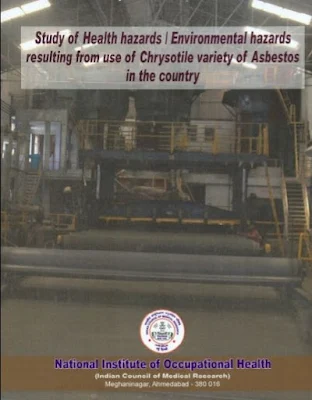By Gopal Krishna*
How can India's Ministry of Chemicals and the Ministry of Health take contrary positions at the United Nations (UN) on all kinds of asbestos including hazardous chrysotile asbestos when both ministries are headed by the same minister, Mansukh Mandaviya?
UN's Tenth Conference of Parties to Rotterdam Convention on Prior Informed Consent (PIC) Procedure for hazardous chemicals in International Trade which is underway in Geneva is considering listing of chrysotile asbestos in the PIC list of hazardous chemicals in compliance with the recommendations of the Chemical Review Committee.
But Indian Ministry of Chemicals remains hostage to an old discredited conflict of interest ridden study co-sponsored by Chemicals Ministry and chrysotile asbestos companies. Even this study does not say that chrysotile asbestos is non-hazardous. This dubious made-to-order study by the Ahmedabad-based National Institute of Occupational Health (NIOH), a unit of Indian Council of Medical Research (ICMR) on chrysotile asbestos belittles India's stature among the world's scientific community.
Notably, this made-to-order study is proudly published on the websites of chrysotile asbestos industry association and the Ministry of Chemicals in total regard of what the World Health Organisation (WHO), the National Health Portal (NHP) and the Supreme Court of India is saying about chrysotile asbestos. The text articulating the position of ministry of health is attached.
There is a logic compulsion for India to support listing of chrysotile asbestos in the PIC list of hazardous chemicals because India's new Occupational Safety Health and Working Conditions Code, 2020 recognises hazardous nature of all kinds of asbestos including the chrysotile asbestos and the diseases caused by it.
Having banned mining of all kinds of asbestos, having banned trade in asbestos waste (dust and fibers), having banned asbestos in talcum powder, having decided to make over 7,000 railway stations asbestos free and having outlawed use of asbestos in ships, it is high time India made it's position consistent with the recommendations of Chemical Review Committee, WHO and International Labour Organisation (ILO).
----
*LL.M, PhD, with Ban Asbestos Network of India (BANI)
How can India's Ministry of Chemicals and the Ministry of Health take contrary positions at the United Nations (UN) on all kinds of asbestos including hazardous chrysotile asbestos when both ministries are headed by the same minister, Mansukh Mandaviya?
UN's Tenth Conference of Parties to Rotterdam Convention on Prior Informed Consent (PIC) Procedure for hazardous chemicals in International Trade which is underway in Geneva is considering listing of chrysotile asbestos in the PIC list of hazardous chemicals in compliance with the recommendations of the Chemical Review Committee.
But Indian Ministry of Chemicals remains hostage to an old discredited conflict of interest ridden study co-sponsored by Chemicals Ministry and chrysotile asbestos companies. Even this study does not say that chrysotile asbestos is non-hazardous. This dubious made-to-order study by the Ahmedabad-based National Institute of Occupational Health (NIOH), a unit of Indian Council of Medical Research (ICMR) on chrysotile asbestos belittles India's stature among the world's scientific community.
Notably, this made-to-order study is proudly published on the websites of chrysotile asbestos industry association and the Ministry of Chemicals in total regard of what the World Health Organisation (WHO), the National Health Portal (NHP) and the Supreme Court of India is saying about chrysotile asbestos. The text articulating the position of ministry of health is attached.
There is a logic compulsion for India to support listing of chrysotile asbestos in the PIC list of hazardous chemicals because India's new Occupational Safety Health and Working Conditions Code, 2020 recognises hazardous nature of all kinds of asbestos including the chrysotile asbestos and the diseases caused by it.
Having banned mining of all kinds of asbestos, having banned trade in asbestos waste (dust and fibers), having banned asbestos in talcum powder, having decided to make over 7,000 railway stations asbestos free and having outlawed use of asbestos in ships, it is high time India made it's position consistent with the recommendations of Chemical Review Committee, WHO and International Labour Organisation (ILO).
----
*LL.M, PhD, with Ban Asbestos Network of India (BANI)

.jpeg)

Comments